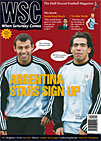 Some people are never happy – take Bayern Munich. Dominant at home but toothless abroad, the German champions have taken out their frustration on Owen Hargreaves, as Karsten Blaas reports
Some people are never happy – take Bayern Munich. Dominant at home but toothless abroad, the German champions have taken out their frustration on Owen Hargreaves, as Karsten Blaas reports
When Bayern Munich secure yet another Bundesliga title, mostly with two or three games to spare, the players gather in the centre circle after the final whistle to celebrate. They start jumping up and down and wave at the crowd. One of them, usually Hasan Salihamidzic or Bastian Schweinsteiger, produces a large glass of wheat beer, a Bavarian speciality, and pours it over somebody else’s head. Oliver Kahn clenches his fists and grits his teeth at the supporters and throws his gloves into the crowd. After about 15 minutes, the players gradually disappear into the dressing room. It’s a dull procedure, probably even for those who feel affiliated to the club.
Winning national trophies simply isn’t a challenge any more. Bayern’s 20 league titles are a national record. They’ve won the championship seven times and the German Cup five times in the past decade. Bayern have the biggest turnover, the most lucrative sponsorship deals and the most expensive squad in the Bundesliga.
The club and their support have long since taken domestic dominance for granted and have directed their ambitions towards Europe. In the past 30 years, hardly any season got on its way without some FCB official promising to win the European Cup. It was a thorn in Bayern’s side that they failed for such a long time to repeat the triumphs of the 1970s when Beckenbauer, Maier and Müller won the trophy three times in a row. After a number of near misses, Bayern finally reclaimed the throne in 2001, beating Valencia. The party that followed went on for a couple of days and was said to have been anything but dull.
Five years later, however, disillusion prevails. Bayern’s national supremacy is stronger than ever after two doubles. But the European summit is moving out of sight. Last season’s Champions League campaign ended in the last 16 with a disastrous 4-1 defeat at the hands of AC Milan, with Bayern completely outplayed. As a result, general manager Uli Hoeness and CEO Karl-Heinz Rummenigge tried to build a stronger team for the new season – and were beaten again. The club stretched out their financial capacities to offer Michael Ballack a new improved contract, but had no chance against Chelsea’s bid. And when they entered the race for Ruud van Nistelrooy, Real Madrid had the bigger wallet.
Bayern have been unable to make as much money domestically as their English, Spanish or Italian counterparts. The Bundesliga’s corporate TV deal keeps bigger clubs such as Bayern from signing more profitable individual contracts with TV stations and is a lot less lucrative than the Premiership’s. In the past five years, the gap has widened significantly. In 2001, the Kirch media group went bankrupt after it had failed to attract the necessary number of subscribers for Bundesliga matches on pay-TV. Since then, the proceeds have risen only moderately. As a result, “Real and Barça earn between €80 and 90 million more than us from their TV deals every season”, as Hoeness pointed out in a recent TV interview. And with a good deal of self-pity, he added: “In the long run, we will have no chance of winning the Champions League again.”
The person who suffers most from this identity crisis, beside Hoeness and Rummenigge, is probably Owen Hargreaves. The Bayern bosses refused to let him join Manchester United for a considerable sum, around €25m, although he was never a dominating player in Bayern’s game. He was used as right-back, right-winger or central midfielder, often as a sub, and for a long time he was best known for taking long‑distance shots from any angle while hardly ever scoring. After his strong World Cup, manager Felix Magath predicted a “leading role” for him, but that didn’t keep Bayern from signing Mark van Bommel from Barcelona’s substitute bench as Ballack’s successor in central midfield. Keeping Hargreaves with Van Bommel around and with so much money at stake appears somewhat strange.
It looks as if Bayern stubbornly insist that, despite recent events, they are one of the big shots. Or maybe it’s meant as a payback for United, since they allegedly changed their mind various times during the Van Nistelrooy transfer circus. In any case, it’s good news for the Bundesliga. Another €25m in Bayern’s pockets would have moved them even further away from the rest of the country and helped ensure even more titles for those who cannot even seem to muster enough enthusiasm to celebrate properly because they are too big for Germany but too small for Europe.
From WSC 236 October 2006. What was happening this month